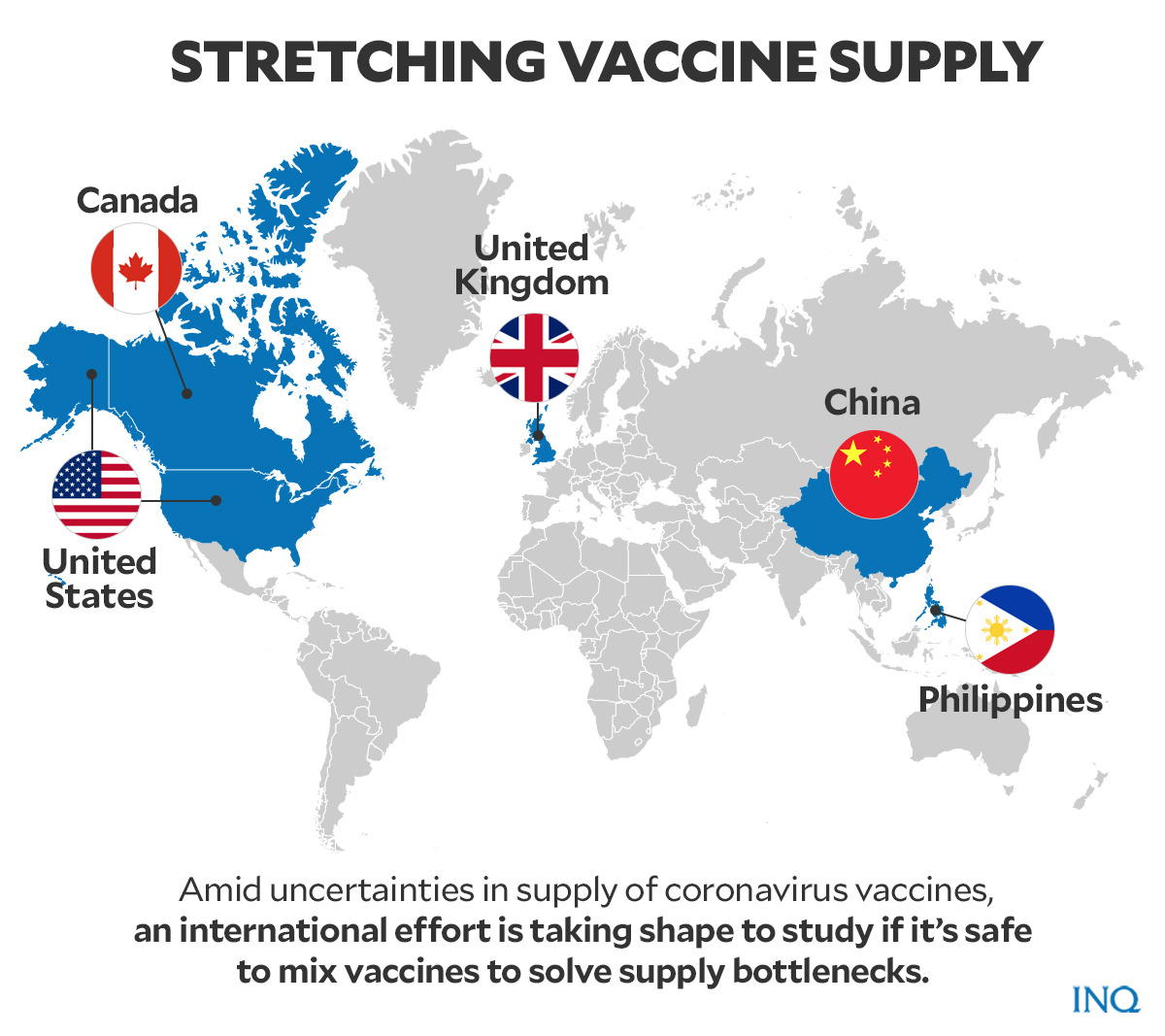MANILA, Philippines—The Philippines has joined a global effort to stretch the supply of coronavirus vaccines by mixing these, which would start with a study to find out if it’s safe and effective.
While the Department of Science and Technology (DOST) has yet to secure approval from the Food and Drug Administration (FDA) and the Philippine Health Research Ethics Board, Secretary Fortunato de la Peña said he expects trials to start in June.
DOST eyeing study on COVID-19 vaccine mixing by June
A few months ago, several Philippine health authorities, including Health Secretary Francisco Duque, maintained that one brand should be used for the first and second doses of vaccines.
Duque said there was insufficient data on the safety and efficacy of mixing vaccines.
But outside the Philippines, several countries are already testing the safety and efficacy of mixed vaccines. These included:

United States
The US Centers for Disease Control and Prevention’s (CDC) issued an updated guideline allowing the mix of Pfizer-BioNTech with Moderna vaccines in “exceptional situations” since both brands use messenger RNA (mRNA), which is supposed to generate protein production by cells to trigger the immune response.
The CDC said in exceptional situations when the second dose of an mRNA vaccine, like Pfizer or Moderna, “cannot be determined or is no longer available, any available mRNA vaccine may be administered at a minimum interval of 28 days between doses.”
In situations where an individual has received a first dose of vaccine but cannot get the same brand, or the same mRNA type of vaccine, for the second dose, a single shot of the vaccine made by Jannsen can be injected with a gap of at least 28 days from the first dose.
This was recommended although there is a lack of study on the safety of a Janssen vaccine being used as a second dose to an mRNA vaccine.
The CDC, however, said “patients who receive Janssen after a does of an mRNA vaccine should be considered to have received a valid, single-dose Janssen vaccination, not a mixed vaccination series.”
These vaccine recipients, the CDC said, “are considered fully vaccinated weeks after receipt of the single dose of the Janssen vaccine.”
United Kingdom
A study, called the Com-Cov vaccine trial, led by the Oxford Vaccine Group in the UK, tests the use of different vaccine combinations for the first and second doses.
In April, researchers involved in the study announced that they will expand their trials to include doses from Moderna and Novavax.
UK trial on switching COVID-19 jabs adds Moderna and Novavax shots
Initial findings released last May 12 in The Lancet, a highly-respected medical journal, showed that individuals, who got Pfizer shots followed by shots made by AstraZeneca, or vice versa, were more likely to experience mild to moderate symptoms of COVID-19.
The makers of Novavax said they would participate in a separate “mix-and-match” vaccine booster trial in the UK in June.
The trial is being led by the University Hospital Southampton NHS Foundation Trust and UK National Institute for Health Research, according to a statement of the Novavax manufacturer.
“This study will assess the safety and immune response against COVID-19 provided by these various vaccine schedules,” the statement read.
The trial is being supported by the UK government’s Vaccine Task Force and Department of Health and Social Care, it said.
China
Gao Fu, head of China’s CDC, said last April that the country is considering mixing different COVID-19 vaccines.
According to an article citing Fu, the government is eyeing vaccine mixing “to solve the issue that efficacy rates of existing vaccines are not high.”
China mulls mixing vaccines to improve efficacy of jabs
Canada
The government of Canada, through its COVID-19 Immunity Task Force (CITF) and the Vaccine Surveillance Reference Group (VSRG), recently said it will support a nationwide study on the effects of mixing and matching vaccines among adults.
CITF, in a statement on its website, said $4.8 million is being spent on the study to assess the safety and efficacy of using two different vaccines for the first and second doses.
“The project will also study the effects of increasing the interval between doses,” CITF said.
The study seeks to have 1,300 participants from different parts of Canada.
“As questions of vaccine interchangeability arise and alternative dosing intervals are being used in public health programs, our objective is to determine: what are the effects of different dosing intervals of the vaccines on immunity and safety,” said Dr. Joanne Langley, of the Canadian Immunization Research Network’s (CIRN) Clinical Trials Network.
“We also want to know what the immune response is if two doses of different COVID-19 vaccine products are used, and how long these responses last,” Langley added.

